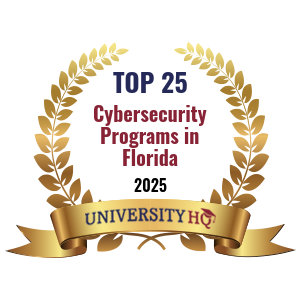What is Cyber Security?
Cybersecurity is a rapidly growing field, with professionals playing a critical role in safeguarding assets in today's digital world. With threats like malware, ransomware, and data breaches becoming increasingly common, businesses and individuals rely on cybersecurity experts to protect their financial data, personal valuables, and online security. In Florida, top cybersecurity programs offer the education and training needed to enter this high-demand industry and become part of the solution to the evolving digital threats.
A cybersecurity specialist plays a vital role in protecting computer networks and databases from cyber threats like hackers, malware, and data breaches. These professionals are trained to identify vulnerabilities and implement security measures to safeguard sensitive information. With an accredited cybersecurity degree in Florida, graduates can access excellent career opportunities in this rapidly growing field. As demand for cybersecurity expertise continues to rise, Florida's top programs equip students with the skills and knowledge needed to excel in this critical industry.
Cybersecurity specialists have the opportunity to specialize in areas such as penetration testing, cryptography, blockchain technology, and network architecture. With the rising demand for cybersecurity professionals, they can find rewarding careers working for the government, financial institutions, or as remote consultants. These experts focus on analyzing computer code and security protocols to safeguard networks and systems from potential threats. Pursuing a cybersecurity degree from a top Florida program provides the necessary skills and training to excel in these high-demand specialties and secure positions across diverse industries.

Featured Online Programs
Top Ranked Campus & Online Cybersecurity Programs in Florida
University of Florida
Score: 88.62
- Undergraduate Tuition
- In-State: $6,381
- Out-of-State:$28,659
- Net Price: $11,521
- Acceptance Rate: 24%
- Retention Rate: 97%
- Graduation Rate: 92%
- Total Enrollment: 54,814
- Undergrad Students: 34,924
- Graduate Students: 19,890
- Grads Salary: $79,000
- Student-to-faculty: 16:1
Florida State University
Score: 81.08
- Undergraduate Tuition
- In-State: $5,656
- Out-of-State:$18,786
- Net Price: $14,903
- Acceptance Rate: 25%
- Retention Rate: 96%
- Graduation Rate: 83%
- Total Enrollment: 43,234
- Undergrad Students: 32,217
- Graduate Students: 11,017
- Grads Salary: $71,000
- Student-to-faculty: 17:1
University of South Florida
Score: 78.83
- Undergraduate Tuition
- In-State: $6,410
- Out-of-State:$17,324
- Net Price: $11,578
- Acceptance Rate: 41%
- Retention Rate: 91%
- Graduation Rate: 75%
- Total Enrollment: 48,572
- Undergrad Students: 37,269
- Graduate Students: 11,303
- Grads Salary: $73,000
- Student-to-faculty: 22:1
Florida International University
Score: 76.68
- Undergraduate Tuition
- In-State: $6,565
- Out-of-State:$18,963
- Net Price: $10,742
- Acceptance Rate: 59%
- Retention Rate: 92%
- Graduation Rate: 74%
- Total Enrollment: 53,953
- Undergrad Students: 44,363
- Graduate Students: 9,590
- Grads Salary: $71,000
- Student-to-faculty: 24:1
University of Central Florida
Score: 76.57
- Undergraduate Tuition
- In-State: $6,368
- Out-of-State:$22,467
- Net Price: $13,110
- Acceptance Rate: 40%
- Retention Rate: 92%
- Graduation Rate: 75%
- Total Enrollment: 69,233
- Undergrad Students: 59,470
- Graduate Students: 9,763
- Grads Salary: $71,000
- Student-to-faculty: 29:1
University of Miami
Score: 76.22
- Undergraduate Tuition
- In-State: $59,926
- Out-of-State:$59,926
- Net Price: $41,028
- Acceptance Rate: 19%
- Retention Rate: 92%
- Graduation Rate: 84%
- Total Enrollment: 19,593
- Undergrad Students: 12,883
- Graduate Students: 6,710
- Grads Salary: $79,000
- Student-to-faculty: 11:1
Florida A&M University
Score: 73.44
- Undergraduate Tuition
- In-State: $5,785
- Out-of-State:$17,725
- Net Price: $15,491
- Acceptance Rate: 21%
- Retention Rate: 86%
- Graduation Rate: 52%
- Total Enrollment: 9,265
- Undergrad Students: 7,796
- Graduate Students: 1,469
- Grads Salary: $74,000
- Student-to-faculty: 14:1
University of North Florida
Score: 73.17
- Undergraduate Tuition
- In-State: $6,389
- Out-of-State:$20,793
- Net Price: $10,628
- Acceptance Rate: 62%
- Retention Rate: 81%
- Graduation Rate: 68%
- Total Enrollment: 16,453
- Undergrad Students: 14,264
- Graduate Students: 2,189
- Grads Salary: $68,000
- Student-to-faculty: 19:1
Florida Atlantic University
Score: 72.77
- Undergraduate Tuition
- In-State: $4,879
- Out-of-State:$17,324
- Net Price: $9,839
- Acceptance Rate: 73%
- Retention Rate: 84%
- Graduation Rate: 64%
- Total Enrollment: 30,790
- Undergrad Students: 24,614
- Graduate Students: 6,176
- Grads Salary: $71,000
- Student-to-faculty: 23:1
The University of West Florida
Score: 72.31
- Undergraduate Tuition
- In-State: $6,360
- Out-of-State:$19,241
- Net Price: $8,908
- Acceptance Rate: 57%
- Retention Rate: 88%
- Graduation Rate: 62%
- Total Enrollment: 14,371
- Undergrad Students: 9,661
- Graduate Students: 4,710
- Grads Salary: $67,000
- Student-to-faculty: 22:1
Embry-Riddle Aeronautical University-Daytona Beach
Score: 70.83
- Undergraduate Tuition
- In-State: $42,304
- Out-of-State:$42,304
- Net Price: $41,550
- Acceptance Rate: 66%
- Retention Rate: 85%
- Graduation Rate: 67%
- Total Enrollment: 11,070
- Undergrad Students: 10,274
- Graduate Students: 796
- Grads Salary: $88,000
- Student-to-faculty: 18:1
Jacksonville University
Score: 68.78
- Undergraduate Tuition
- In-State: $46,180
- Out-of-State:$46,180
- Net Price: $25,745
- Acceptance Rate: 57%
- Retention Rate: 75%
- Graduation Rate: 57%
- Total Enrollment: 3,957
- Undergrad Students: 2,662
- Graduate Students: 1,295
- Grads Salary: $76,000
- Student-to-faculty: 13:1
Nova Southeastern University
Score: 68.47
- Undergraduate Tuition
- In-State: $37,080
- Out-of-State:$37,080
- Net Price: $32,756
- Acceptance Rate: 73%
- Retention Rate: 76%
- Graduation Rate: 64%
- Total Enrollment: 20,877
- Undergrad Students: 7,219
- Graduate Students: 13,658
- Grads Salary: $80,000
- Student-to-faculty: 17:1
Stetson University
Score: 67.64
- Undergraduate Tuition
- In-State: $55,220
- Out-of-State:$55,220
- Net Price: $22,914
- Acceptance Rate: 86%
- Retention Rate: 73%
- Graduation Rate: 63%
- Total Enrollment: 3,669
- Undergrad Students: 2,338
- Graduate Students: 1,331
- Grads Salary: $71,000
- Student-to-faculty: 10:1
Florida Southern College
Score: 66.03
- Undergraduate Tuition
- In-State: $42,360
- Out-of-State:$42,360
- Net Price: $30,462
- Acceptance Rate: 59%
- Retention Rate: 78%
- Graduation Rate: 69%
- Total Enrollment: 3,194
- Undergrad Students: 2,626
- Graduate Students: 568
- Grads Salary: $65,000
- Student-to-faculty: 10:1
Saint Leo University
Score: 65.29
- Undergraduate Tuition
- In-State: $28,360
- Out-of-State:$28,360
- Net Price: $19,478
- Acceptance Rate: 72%
- Retention Rate: 58%
- Graduation Rate: 49%
- Total Enrollment: 10,231
- Undergrad Students: 7,603
- Graduate Students: 2,628
- Grads Salary: $76,000
- Student-to-faculty: 20:1
Embry-Riddle Aeronautical University-Worldwide
Score: 65.15
- Undergraduate Tuition
- In-State: $11,665
- Out-of-State:$11,665
- Net Price: $20,183
- Acceptance Rate: 62%
- Retention Rate: 67%
- Graduation Rate: 22%
- Total Enrollment: 12,268
- Undergrad Students: 9,037
- Graduate Students: 3,231
- Grads Salary: $90,000
- Student-to-faculty: 22:1
Florida Polytechnic University
Score: 64.63
- Undergraduate Tuition
- In-State: $4,940
- Out-of-State:$21,005
- Net Price: $11,923
- Acceptance Rate: 56%
- Retention Rate: 75%
- Graduation Rate: 53%
- Total Enrollment: 1,618
- Undergrad Students: 1,569
- Graduate Students: 49
- Grads Salary: $58,900
- Student-to-faculty: 17:1
The University of Tampa
Score: 63.79
- Undergraduate Tuition
- In-State: $33,424
- Out-of-State:$33,424
- Net Price: $35,975
- Acceptance Rate: 41%
- Retention Rate: 80%
- Graduation Rate: 62%
- Total Enrollment: 11,054
- Undergrad Students: 10,111
- Graduate Students: 943
- Grads Salary: $68,000
- Student-to-faculty: 17:1
Florida Gateway College
Score: 63.47
- Undergraduate Tuition
- In-State: $3,100
- Out-of-State:$11,747
- Net Price: $4,428
- Acceptance Rate: 100%
- Retention Rate: 79%
- Graduation Rate: 57%
- Total Enrollment: 2,837
- Undergrad Students: 2,837
- Graduate Students: N/A
- Grads Salary: $52,000
- Student-to-faculty: 14:1
St. Petersburg College
Score: 62.4
- Undergraduate Tuition
- In-State: $2,682
- Out-of-State:$9,286
- Net Price: $300
- Acceptance Rate: 100%
- Retention Rate: 74%
- Graduation Rate: 37%
- Total Enrollment: 23,350
- Undergrad Students: 23,350
- Graduate Students: N/A
- Grads Salary: $63,000
- Student-to-faculty: 25:1
Miami Dade College
Score: 62.35
- Undergraduate Tuition
- In-State: $2,838
- Out-of-State:$9,661
- Net Price: $5,367
- Acceptance Rate: 100%
- Retention Rate: 68%
- Graduation Rate: 45%
- Total Enrollment: 39,139
- Undergrad Students: 39,139
- Graduate Students: N/A
- Grads Salary: $61,000
- Student-to-faculty: 17:1
Seminole State College of Florida
Score: 61.43
- Undergraduate Tuition
- In-State: $3,227
- Out-of-State:$11,447
- Net Price: $2,889
- Acceptance Rate: 100%
- Retention Rate: 66%
- Graduation Rate: 42%
- Total Enrollment: 14,104
- Undergrad Students: 14,104
- Graduate Students: N/A
- Grads Salary: $62,000
- Student-to-faculty: 26:1
Northwest Florida State College
Score: 61.29
- Undergraduate Tuition
- In-State: $3,246
- Out-of-State:$11,625
- Net Price: $6,339
- Acceptance Rate: 100%
- Retention Rate: 60%
- Graduation Rate: 43%
- Total Enrollment: 5,160
- Undergrad Students: 5,160
- Graduate Students: N/A
- Grads Salary: $64,000
- Student-to-faculty: 22:1
St. Thomas University
Score: 60.69
- Undergraduate Tuition
- In-State: $34,770
- Out-of-State:$34,770
- Net Price: $27,029
- Acceptance Rate: 99%
- Retention Rate: 55%
- Graduation Rate: 43%
- Total Enrollment: 6,455
- Undergrad Students: 3,967
- Graduate Students: 2,488
- Grads Salary: $79,000
- Student-to-faculty: 17:1
Online Cyber Security Education in Florida
To meet the growing demand for cybersecurity professionals, Florida’s colleges and universities offer top-notch cybersecurity training. While some schools offer specialized degrees in cybersecurity, most computer science and information technology programs include relevant coursework. Additionally, Florida's community colleges offer cybersecurity degree programs at the associate level.
While many of Florida's cybersecurity programs are excellent, students should consider those designated as a Center of Academic Excellence (CAE). This designation, awarded by the Department of Homeland Security and the National Security Agency, indicates that graduates are equipped to handle cybersecurity threats to national security. CAE programs offer rigorous and comprehensive curricula.
Graduates of cybersecurity programs in Florida will find ample job opportunities in both public and private sectors. Federal law enforcement agencies and state organizations need information security professionals to strengthen systems and protocols. Additionally, Florida's private sectors, especially finance and healthcare, require cybersecurity experts. Healthcare systems, in particular, are often targeted by ransomware attacks, making the protection of patient records a priority.
All in all, Florida is a terrific state in which to start and build a successful career in cyber security. The dynamic and ever-changing economy is sure to provide challenges and rewards for a lifetime.
Online Associates (AS)

There are many community colleges that now offer an associate cyber security degree or other associated technology degrees. These programs are able to help students launch into the cyber security field with the knowledge necessary to help their firm achieve top security. Even the top cyber security accreditation, CAE, is available to these associate degree programs.
When students start off from a community college, they see that their up-front tuition costs are far lower than those from a Florida college or university. They also tend to find smaller class sizes and a peer group that is just as engaged with cyber security as any other student. Since many community college instructors are working cyber security professionals who love teaching, the level of instruction in a community college can often equal or surpass that found in top Florida universities. Thus, they can use their associate cyber security degree as an affordable academic launchpad for their career or as a foundation for more study including professional certifications, a bachelor’s degree, and more.
Online Bachelors (BS)

For most employers, a bachelor’s cyber security degree is the minimum requirement for their hiring process. These degrees also offer students a lot more in terms of fleshing out their cyber security education to include more programming knowledge as well as deeper explorations into specific areas of cyber security such as penetration testing, security architecture, and database security. A four-year degree that concentrates on information security offers other advantages.
For instance, a bachelor’s cyber security degree can allow students the opportunity to take on a minor concentration that informs their primary focus. Some complimentary fields include mathematics, computer science, and even philosophy. Along the way, students can find internships that will allow them to gain real-world experience in cyber security. A full bachelor’s degree is also a necessary prerequisite for a master’s cyber security degree and many professional certifications. Those professional certifications can be equally, if not more important when it comes to advancing a career.
Online Masters (MS)

For those who want to see their salaries and status explode, a master’s cyber security degree is vital to long-term growth and success. In fact, many will want to consider an MBA if their desire is to move into management and the C-suites. The title of chief information security officer (CISO) often requires that candidates have deep training in business as well as their technological focus. For these professionals, an MBA that is paired with an information security concentration is optimal.
Yet another option is to pursue a dual MBA. These programs have been flourishing in the past few decades as professionals need a broad base of knowledge and expertise. Cyber security experts can thus find a dual MBA program that will fast-track two graduate degrees, one in business and the other in cyber security. Dual MBA programs typically take three years to complete and will launch your resume to the top of the stack.
Online Doctorate (PhD)
High tech fields are one area where big business seems to seek out those with a PhD or doctorate degree. Cyber security experts who go the full distance and achieve a doctoral degree will find that their opportunities expand greatly. In fact, many will even leave their doctoral programs prior to full completion. That is, it's not uncommon for students to complete the PhD coursework yet not finish their dissertations. These professionals are known as ABD, or all but dissertation and this status is unlikely to have a negative impact on their careers.
If a cyber security professional can show that they have PhD level skills in areas such as cryptography, data science, or other areas pertinent to information security, they will have to fend off all of the dream job offers. Many of these offers may end up be an extension of their academic work as many of them will land positions where they conduct vital research projects that will result in new products or information security protocols.
Read our Financial Aid & FAFSA Guide Read more on how to pay for collegeBecome a Cyber Security Professional in Florida
Cyber security is a growing field rooted in computer science, making it an ideal career for those with an early aptitude for technology. Aspiring professionals should begin developing their skills both in school and through extracurricular projects. Informal learning can be just as valuable as formal academic training. To become a cyber security professional in Florida, it's crucial to start building expertise early.
In high school, students should look for Florida schools that focus on STEM subjects like computer science, software development, and IT. Continuing studies in math is essential for success. High school is also a time to connect with peers who share similar interests, collaborating on software projects or exploring new, creative approaches to their passions.
When applying to college, students should look for computer science programs specializing in cyber security or those focusing exclusively on the field. A key indicator of a quality program is accreditation as a Center of Academic Excellence (CAE), awarded by the Department of Homeland Security and the NSA. CAE programs are available at all education levels, starting with associate degrees, and can lead to long-term success in information security.
Here's a step by step list!
- Choose the Right College Program: Apply to accredited computer science or cyber security programs, ideally those recognized as Centers of Academic Excellence (CAE).
- Earn a Degree: Complete an associate, bachelor's, or master's degree in cyber security or related fields.
- Gain Experience: Participate in internships, work on personal projects, and gain hands-on experience in cyber security.
- Obtain Certifications: Pursue industry certifications like CompTIA Security+, Certified Ethical Hacker (CEH), or CISSP to enhance job prospects.
- Start Your Career: Apply for cyber security positions in Florida's government, private sector, or as a consultant.
Find Online Cybersecurity Schools
Potential Careers for Cyber Security Graduates
- Security Analyst:
These cyber security experts spend their days analyzing the security systems and protocols for their firm or client. They also research new threats to their systems as well as new software or other solutions. Analysts may work as part of a larger cyber security team and their work will be vital when it comes to knowing what parts of a security system need work. - Information Technology Manager:
Some firms have whole departments dedicated to information technology. The managers are often IT experts who either have master’s degrees in IT or an MBA with a concentration in IT or a related field. In their daily work, IT managers delegate workers to address matters related to efficiency, security, and maintenance of the firm's computing systems. - Information Security Manager:
These professionals oversee a team of information security (infosec) professionals. They might also be involved in hiring new security workers or contracting with outside security professionals who can help strengthen their firm's security. For instance, if the firm has built a new information security system, they may hire an outside penetration tester to ascertain its relative vulnerability. - Network Engineer:
Each firm needs a rock-solid network over which it can conduct its day-to-day business. These networks are designed, constructed, and maintained by network engineers who constantly strive to make the network as efficient as possible. In the case of multinational corporations, of which Florida has many, network engineers address not only matters of simple networking but also cyber security issues as well. - Network Administrator:
These administrators work on a firm's network and see to its day-to-day operation. They help employees and special clients set up user accounts on the network and assign each account its own set of permissions. They must work with the database team to facilitate these permissions as well as meet with department heads to determine what aspects of the network need adjustments or enhancements. - Information Technology Director:
This professional sits above their IT managers and help direct the overall trajectory of a firm's IT infrastructure. They most often have a master’s degree in IT or an MBA with an IT concentration. In some firms a person of this stature may be called the Chief Information Officer or there may be firms large enough to have multiple directors that answer to the CIO. - Cloud Information Security Engineer:
This is an increasingly important position in any firm. Cloud computing is becoming a part of daily life for many corporations and individuals alike so there is a great need for infosec in this sector. These engineers thus are charged with creating the security systems needed to ensure everyone's safety. - Penetration Tester:
These infosec professionals are often referred to as pentesters. They are also known as ethical hackers or white hat hackers. They are typically seasoned cyber security professionals who work as consultants in the infosec space. Their job is to attempt to break into a computer network or database as though they were a nefarious hacker. They determine what, if any, vulnerabilities exist and report to their client or boss.
Sources:
Search All Programs

























